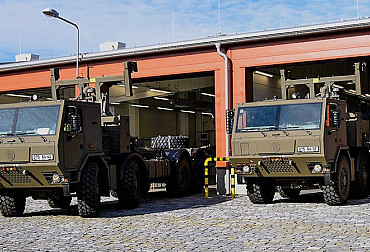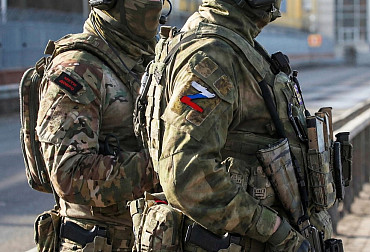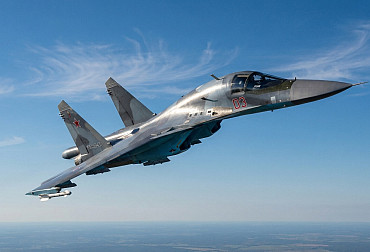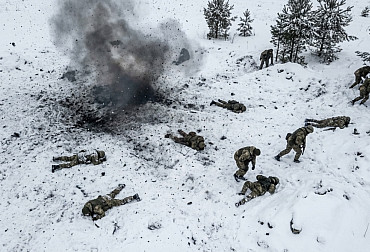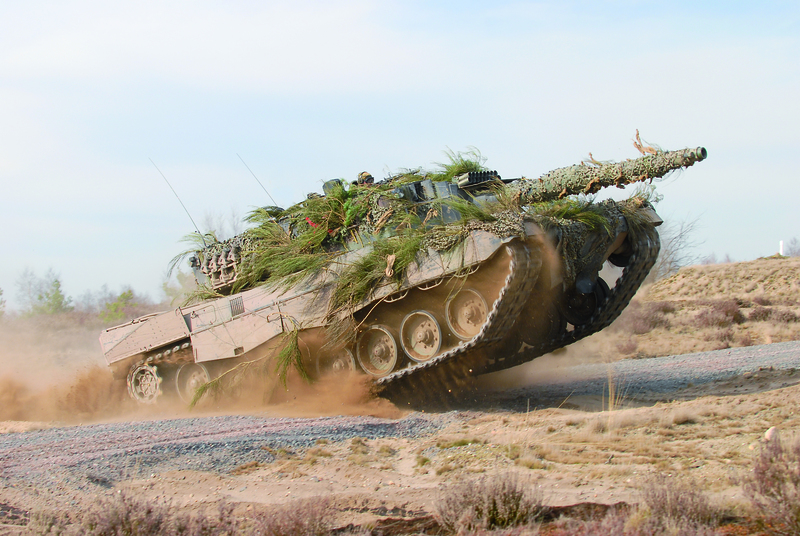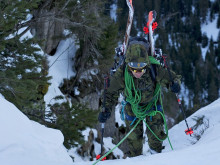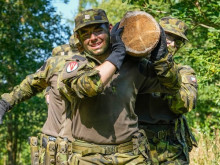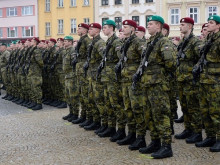Defence Committee discusses tracked IFVs, Leopard acquisition and donations of military equipment to Ukraine
The Defence Committee has held its second meeting in five days. The last scheduled meeting before the parliamentary recess was attended by Defence Minister Jana Černochová, the Chief of the General Staff of the Army of the Czech Republic, Army Gen. Aleš Opata, Deputy Minister of Defence for Armaments and Acquisitions Lubor Koudelka and other guests. The deputies returned, among other things, to the items from the previous meeting and heard, for example, information from the Ministry of Defence of the Czech Republic on the contract for tracked Infantry Fighting Vehicles or the purchase of Leopard tanks. MEPs also resumed the adjourned session on donations to Ukraine.
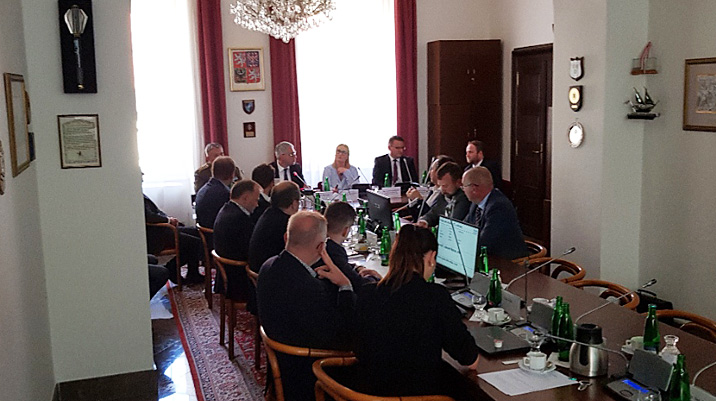 Picture: The Defence Committee has held its second meeting in five days. | Jan Zilvar / CZ DEFENCE
Picture: The Defence Committee has held its second meeting in five days. | Jan Zilvar / CZ DEFENCE
At the outset, the Committee approved the 2nd supplement to the participation of the Czech Armed Forces in military exercises outside the Czech Republic and the participation of the armed forces of other states in military exercises on the territory of the Czech Republic in 2022. This is a supplement to the original Government resolution approved on 22 November 2021 and its 1st supplement approved on 9 March this year. It contains clarifying information on three exercises outside the Czech Republic, especially in terms of dates, changes in the number of days, persons, equipment, training units of foreign units and the Czech Army. The TANKER exercise was newly included on the territory of the Czech Republic. The Army will train together with the U.S. Air Force. The capacities of Pardubice airport will be checked in case of support of NATO air units in in-flight refuelling. This exercise will also include a review of flight routes.
However, the information that was originally expected to be presented at the last meeting was mainly about the status of the contract for the acquisition of tracked IFVs and the purchase of Leopard tanks. However, the document, entitled "Non-confidential summary of the main conclusions and recommendations of the legal assessment of the contracting authority's procedure in the strategic procurement project entitled tracked Infantry Fighting Vehicle and its modification - purchase", states that as the multi-round negotiation procedure is still ongoing, the legal assessment would jeopardise the ongoing decision-making process of the Ministry. Therefore, according to the law firm, it is not possible to publish the full text of the legal assessment. According to the Minister, the main reason for the problems in the implementation of this tender is the number of bureaucratic processes that have lasted for more than 10 years. According to her, the previous Governments should have adopted a completely different procedure in this contract, there was no will to start negotiations with the Governments directly at that time. Another problem in October last year was the exclusion of bids and not bidders, even though one of the bidders did not submit the required documents, such as the Contract for Future Contract, its bid was significantly more incomplete than the other bidders and its price was higher. There has also been a significant increase in the price of inputs, so that it will be very difficult to maintain the maximum price set.
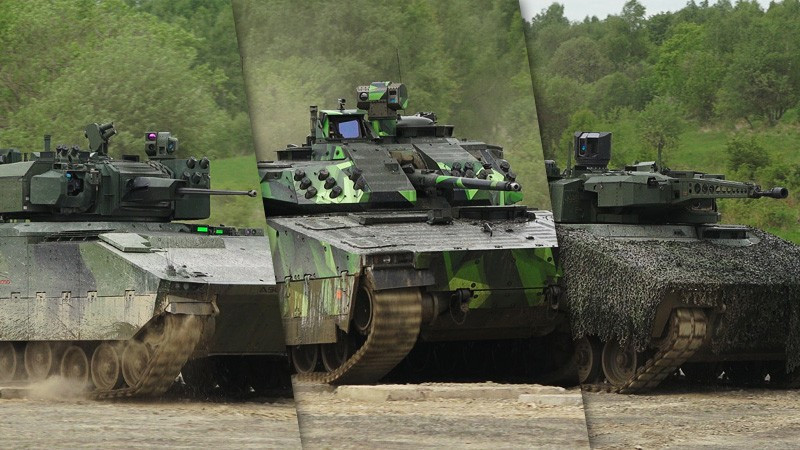 Picture: Members of the committee received the promised opinion of the law firm HAVEL & PARTNERS s.r.o. (illustration photo) | Jan Juřica / CZ DEFENCE
Picture: Members of the committee received the promised opinion of the law firm HAVEL & PARTNERS s.r.o. (illustration photo) | Jan Juřica / CZ DEFENCE
The solution to this unsatisfactory situation is to send information to all three suppliers (BAE Systems, GDELS and Rheinmetall) about the substantially changed negotiating conditions. As stated by Deputy Koudelka in the debate, the subsequent procedure will be as follows: 'By the end of this week, all suppliers will be informed of the new tender conditions in a letter. The essential condition for proceeding will be the express agreement of all three participants and the waiver of any claims, in particular for compensation for damages incurred by the participants as a result of the tender procedure. If the tender is not evaluable, the contractor will be excluded from the tender, not merely eliminated. A bidder would be excluded if it submitted a higher price bid than the originally estimated value of CZK 51.68 billion including VAT. The Ministry could also terminate negotiations with any of the bidders and exclude them from the tender without giving any reason, as well as terminate the assessment or evaluation of the submitted bid. If all potential suppliers do not agree to these new conditions, the contract will be cancelled and a new, simpler tender or a different method of selecting the supplier will be announced. These steps must be taken within a number of weeks." According to Minister Černochová, the current procedure has caused only one thing: "We can only minimize the risks of litigation, but it will be difficult to eliminate them. We want to save the unfortunate situation so that our Army gets everything it needs to defend our country and fulfil its allied commitments." The unnecessary bureaucracy and the length of the tender were repeatedly mentioned during the debate. In a subsequent vote, MEPs suspended the debate until 30 August. At that time it should be clear whether the tender will continue under the amended conditions or whether another method of selecting a contractor will be chosen.
For the first time ever, the members of the Defence Committee were able to see information from the Ministry on the acquisition of Leopard tanks. As Minister Černochová stated at the beginning of the discussion, this is a fulfilment of the Army's capability and the concept of building a heavy mechanised brigade. "The aim is to acquire 58 battle tanks and 15 combat support and combat support tanks, all on the same platform. These numbers represent a tank battalion of four tank companies, plus one tank company of active reserves." According to the Minister, the Leopard 2 A7 tank from the German company KMW is a suitable alternative for the needs of the Czech Army. The Ministry of Defence is currently preparing to implement the donation of 15 Leopard 2 A4 tanks from the Federal Republic of Germany as compensation for its support to Ukraine.
These tanks will realistically be fully operational, including ammunition, spare parts and initial training. Negotiations are currently underway at two levels. Firstly, a Donation Contract under which the Army could have its first tank by the end of the year so that training can take place. Regarding the purchase of new vehicles, the Minister said that there is no commitment that if we receive donated tanks we must also buy new ones from the same company. Therefore, she is simultaneously looking for the most suitable solution that will ensure a realistic price and parameters that are common in neighbouring countries. Inspiration comes from neighbouring countries, such as Poland, which is buying 250 state-of-the-art Abrams tanks and at the same time negotiating the acquisition of South Korean K2 Black Panther tanks. Deputy Minister Lubor Koudelka added that the servicing of the donated tanks will be carried out on the basis of a contract between the Czech Republic and Rheinmetall. The Czech defence industry will also be involved.
The MEPs also returned yesterday to the information provided by the Ministry of Defence on the donations made to Ukraine. At the previous meeting, opposition members of the Committee criticised the report for being very general and insisted on specific information. Defence Minister Černochová said that the provision of military equipment was approved by the Government on an ongoing basis. It had decided to provide military and humanitarian material worth CZK 3.7 billion. She refused to disclose the specific items of this aid, as did Deputy Minister Czech at the previous meeting, on the grounds that the information was "confidential" and could endanger the defence and security of the Czech Republic. According to the minister, EU countries were invited to do so by NATO Secretary General Jens Stoltenberg. According to the minister, the Czech Republic has already asked the EU to reimburse some CZK 3.2 billion under the so-called European Peace Facility. To date, donations of material worth almost CZK 2.2 billion have been recommended as suitable for reimbursement. "The funds received will be used for the acquisition of new modern equipment and material for the Army," the minister said. Thus, some MPs once again failed to specify the donations and aid to Ukraine, although they referred to the opinion of the House's legislative department on the handling of classified information. However, before the adjournment of this item until 30 August 2022, Minister Černochová promised to inform the Committee in detail once the conflict in Ukraine had subsided.
At the end of the meeting, the chairman of the Defence Committee, Lubomír Metnar, thanked General Opata, who is retiring as Chief of the General Staff, for the work he has done for the Army and for his cooperation with the three defence ministers. He appreciated his mandate in a period full of new experiences and trials. Whether it was the end of the mission in Afghanistan, the modernisation of the Army, the fight against the Covid-19 pandemic or the current war in Ukraine.
Today, at its regular session, the Government of the Czech Republic will discuss, among other things, amendments to the Constitution of the Czech Republic. This is an amendment to Article 43 of Constitutional Act No. 1/1993 Coll., the Constitution of the Czech Republic, as amended by Constitutional Act No. 300/2000 Coll. and Article 11 of Constitutional Act No. 110/1998 Coll, This would allow the Government, by its decision, to send soldiers outside the territory of the Czech Republic for up to 60 days under certain fixed conditions, to authorise the armed forces of other states to make passages through the territory of the Czech Republic or flights over the territory of the Czech Republic and to authorise the participation of Czech soldiers and soldiers of the armed forces of other states in exercises outside and on the territory of the Czech Republic.
We therefore asked the Committee members the following: On Wednesday, the Government is expected to discuss a draft amendment to Article 43 of the Constitution of the Czech Republic. This amendment should enable the state to respond to all kinds of threats flexibly, quickly and effectively, even though the warning period has been substantially shortened. Do you agree with this amendment and will you support it in the Chamber?
Below are the responses of those who responded:
Lubomír Metnar (ANO), Chairman of the Committee
Changes to the Constitution of the Czech Republic and the constitutional order should generally be approached with restraint, and any changes should be made on the basis of a broad expert discussion. The actual form of the proposal to amend Article 43 of the Constitution will be discussed in detail in the Deputies' Club and at a meeting of the ANO shadow Government.
Josef Flek (STAN), Vice-Chairman of the Committee
The current wording is rather restrictive - although I understand the circumstances and the intention of the constitution-maker in constructing this amendment. Just to remind you, today the Government may decide, without the consent of Parliament, to send the Armed Forces of the Czech Republic abroad and to have the armed forces of other states stay on the territory of the Czech Republic for a maximum of 60 days, and only under strict conditions: if it concerns the fulfilment of obligations under international treaties on joint defence against attack; or participation in peacekeeping missions of an international organisation of which the Czech Republic is a member, with the consent of the state where the peacekeeping mission will operate; and last but not least, if the Czech Republic participates in rescue work in natural disasters, industrial/ecological disasters, etc. However, a problem may arise if we attempt operations to rescue Czech citizens illegally detained abroad. We would not find this case in the current wording of Article 43. It would also make it more difficult to deploy operations to combat illegal migration. These are just a few of the many reasons to increase the flexibility of government decision-making.
Parliament will not be completely removed from decision-making; it is just that there is more space and flexibility in Government decision-making. We still have a number of tools here as Members to overturn a potentially bad decision by the Government. It is still limited to 60 days. A dissenting opinion from one of the chambers is sufficient to overturn a decision: provided that such an opinion is adopted by a majority of all the members of that chamber.
The Legislative Council of the Government of the Czech Republic has given a positive opinion on the plan, which is indicative for me. I can assure the public that no one is planning a war dictatorship here. Before the constitutional change is made, a number of bodies will express their views on it - e.g. the committees of the Parliament and the Senate, the specialised Standing Committees on the Constitution of the Czech Republic of both chambers, etc. The discussion is not over, it is just beginning.
Jan Hofmann (ODS), Vice-Chairman of the Committee
I agree. It is essential that the state should be able to react flexibly, quickly and effectively in these new conditions, even though the warning period has been substantially shortened. Under the current arrangements, for example, it would be extremely difficult to deploy the Czech Armed Forces in time to save the lives of Czech citizens unlawfully detained abroad or citizens whose lives are in danger as a result of armed conflicts, epidemics or pandemics, natural disasters, industrial accidents and other events with similar consequences.
Stanislav Blaha (ODS), member of the Committee
I will certainly support it. The constitutionality of our country should be interfered with as little as possible, but the increased security threat not far from us proves that we must be able to react quickly even to unexpected situations that may arise. And to do that, we need adequate constitutional tools. The mobilisation of our armed forces must be as swift as possible. This is even in extreme cases where waiting for confirmation by Parliament could complicate the situation and possible solutions. The new regulation does not strengthen the position of the Government, the principles of the separation of powers are preserved, and therefore I think that the opposition should be in favour of its adoption in the House.
Jiří Horák (KDU-ČSL), member of the Committee
The aim of the amendment to the Constitution is to make the current mechanism more efficient by transferring the power to approve the passage and overflight of foreign troops from the Parliament to the Government, and at the same time to extend the Government's powers in the area of sending armed forces abroad, where it can send armed forces for up to 60 days under specific conditions. However, the control mechanism of both Houses of Parliament must be maintained. I would agree with the proposal in these circumstances, particularly in view of the unpredictability of the current security situation in Eastern Europe.
Karel Krejza (ODS), Member of the Committee
I agree. It is needed in emergency situations, such as the evacuation from Kabul, when the constitution was pushed to the limit. Decisions such as this, where people's lives are at stake, are made within hours, and it is not possible to convene the House of Commons at such speed to give its approval.
Radovan Vích (SPD), member of the Committee
I do not agree with this proposal to amend the Constitution of the Czech Republic. It is completely unacceptable for the Government of the Czech Republic to decide on the deployment of the Armed Forces of the Czech Republic without consulting Parliament. We consider the current wording of the Constitution of the Czech Republic in terms of the deployment of soldiers for humanitarian and rescue operations to be sufficient.











